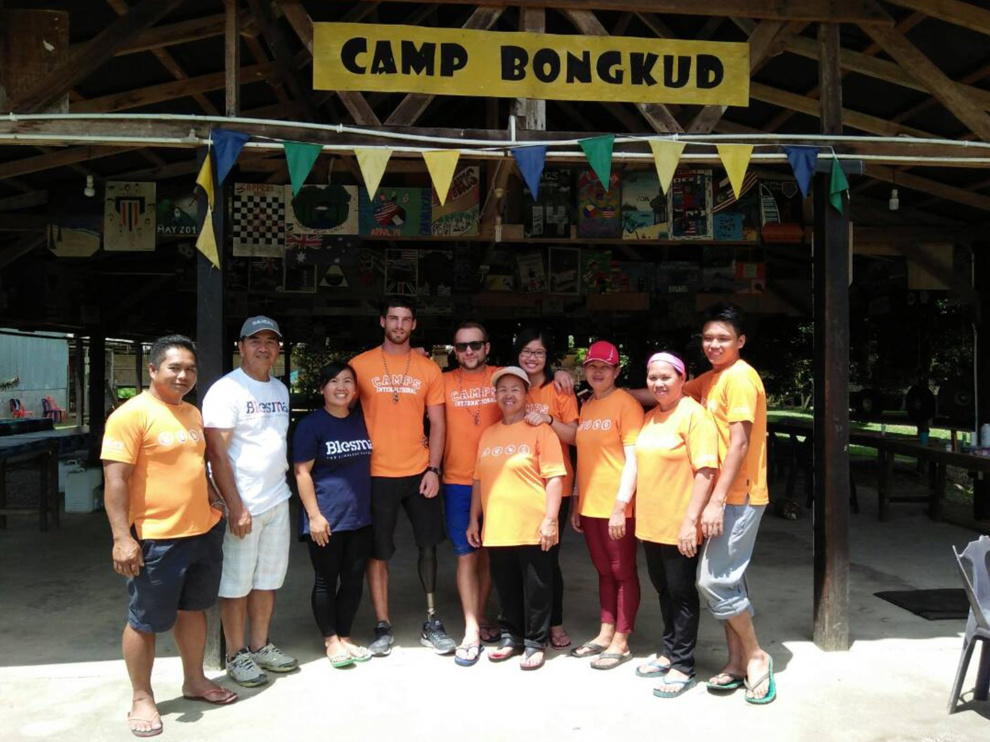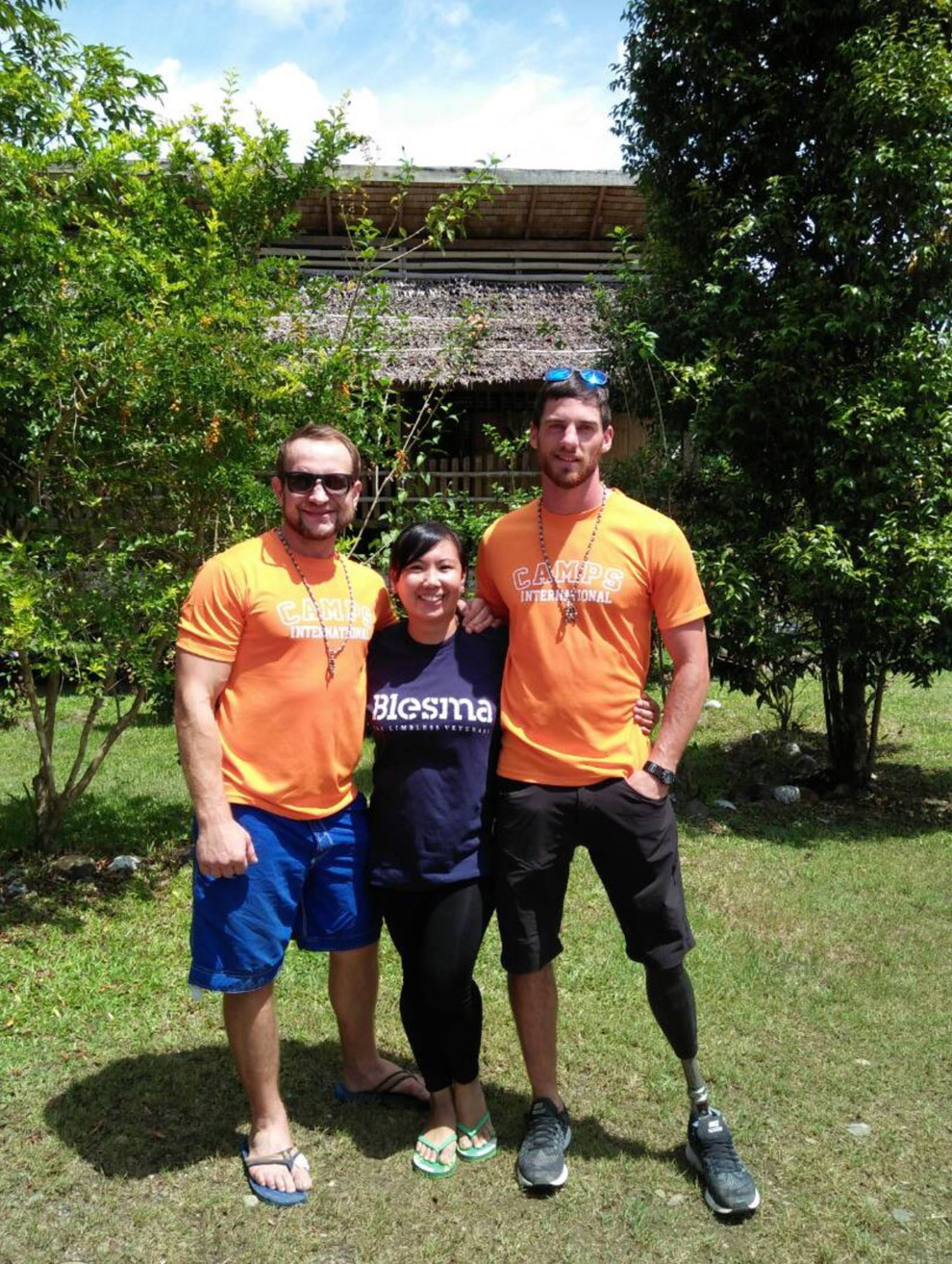A new partnership between Blesma and Camps International gives Members the chance to see remote and exotic parts of the world - and give something back.
Wyn Austin, 29, from Grantham served in the Royal Dragoon Guards before he was injured in Afghanistan in 2010, losing his left leg above the knee when his Viking patrol vehicle was hit by an IED. Billy Drinkwater, 32, from London, served with the Royal Anglian Regiment, and lost his right eye in an IED blast in 2010. In July, the pair spent a month in Borneo with a group of teenagers aged between 15 and 18 as part of a Camps International project.
This award-winning volunteering organisation partners with communities across the world to run expeditions that aim to make long-term positive impacts. During their month in the rainforests of Borneo, Wyn and Billy helped oversee the construction of a market square and the building of a section of a new kindergarten. They mentored groups of teenagers from the UK in the process, each of whom had raised thousands of pounds to be there. When the intrepid duo returned home they were eager to explain how it all went – and how they dealt with snakes, tropical storms and the odd cheeky teenager!

How did you get involved with the trip?
Billy: I’ve already taken part in the Blesma Community Programme, which teaches you how to tell your story to groups of students as a way to inspire them. It helps them to see and understand how you’ve overcome adversity. I really enjoyed doing that and so Blesma thought working with teenagers on this expedition would be a natural progression. I went along to the selection process and thought it sounded great.
Wyn: The guys at Blesma approached me because they thought I might be interested. I was interviewed by people from Blesma and Camps International, and was lucky enough to be selected. I didn’t know much about the country before then to be honest, so I had to quickly do my homework.
What kind of prep did you have to do before you travelled to Borneo?
Wyn: I was a bit worried about the heat and humidity, which can cause issues with my leg, so I went to see my prosthetist and got my socket as tight as possible. Then I just made sure I had the right kit: good boots, breathable clothing, knives, torches – it was just like being back in the military!
Billy: I wasn’t sure what to expect in Borneo – especially when I had to get what seemed like every vaccination under the sun! I have a lot of trouble with my eyes – I have to keep them really clean – so I was concerned about how hygienic the camps would be.
What were your first impressions of Borneo?
Wyn: It was a bit mad! It was an 18-hour flight and then we were in a pretty sparse hostel for the first night – just a mattress on the floor. The next morning we drove up to Camp Bongkud – where we were going to be staying and working – and the whole place was a quagmire after a tropical storm! We wondered what we’d let ourselves in for, but things soon improved.
Billy: I lost my phone as soon as we landed! The heat was crazy, but when we got to the camp everyone was very welcoming. We were given a tour of the village, and finally learned what we’d be doing.
Which was?
Billy: We were going to build a market square, completely concreting it over with the help of the locals. Previously, if there was a storm, it would just get flooded and people wouldn’t be able to sell their goods, which had an impact on the local economy. We spent a lot of time mixing cement!
Wyn: Our job was to oversee the teenagers as they worked. We made sure health and safety was being observed, and showed them how to do things properly. The key was striking a balance between making them work hard and keeping them happy. They’d raised a lot of money to go out there, so it wasn’t about making them bust a gut, but we still wanted them to push themselves, and feel like they’d really worked hard and given something back.
Billy: I also got involved in teaching English to small groups of kids aged between seven and 12. I really loved that. Every day it felt as though I grew and improved. I definitely saw a difference in my abilities.
Wyn: To actually complete the project was incredibly satisfying. We saw the local community hold a market in the square once it was finished, which was great. We also built a volleyball court. There was one there already, which the local community loved – they hold big tournaments on it. The second one will help expand that community area even more. And we also worked on a kindergarten project, which will open towards the end of this year.

How did you find the British teenagers who were working on the project?
Wyn: Great. I’ve never worked with kids before, but Billy and I both seemed able to gain their respect and got them to follow the plan. They’re teenagers, and some of them have a few issues, but we found that if the teachers on the trip weren’t getting through to them, they’d usually listen to us. Maybe they responded to our military backgrounds. Billy and I both gave talks about our lives, and how we use resilience to overcome adversity. I think that made a difference. None of them gave us any lip!
Billy: I told my story to five different groups, and each time I told it, it got better and better. It meant everyone knew who we were. My injuries are less obvious than Wyn’s because I have a false eye, but they understood us better after the talks.
How did you find the locals?
Wyn: They were really nice. It was very important that they wanted us to be there, and Camps International also provided some with employment. We were making the concrete for the market square, for example, but locals were being paid to trowel it out. For the kindergarten, skilled locals were also getting paid. It’s a beautiful place, too. We walked up Bongkud Hill, which has a lot of steps. I can only do one step at a time with my injury, so it took a long time, but the views of Mount Kinabalu at the top were superb.
Billy: I learned the language a little bit and really got on with everyone around the village and shops. Learning a few words really does go a long way. Everyone was so friendly and had so much time for us.
How much did successfully completing the trip mean to you?
Wyn: The whole thing gave me a massive sense of achievement. We were invited to the chief’s house on the last night, which is apparently quite a rarity, and when I was making a speech, something occurred to me that made complete sense. I said: “I’ve been getting help for the last seven years since being injured, so to be helping other people is fantastic.”
Billy: I got a lot out of it. I’d recommend it to anyone. I took part in a jungle trek at the end of our stay, and I felt like I was back in a team environment for the first time since leaving the Army. That was very satisfying, although I got a lot of blisters – and we even had to run away from a viper! Wyn: Our talks made a massive impact on the kids, too, which was something we weren’t expecting. Camps International has a system where you can anonymously leave positive notes for people in an envelope. We got so many! Some of them were making us choke up with emotion. Kids can have a hard time growing up, and we helped to show them that there are ways to get over things. That was incredibly inspiring.
Do you think the experience will spur you on to do more things like this?
Billy: Definitely. I’ve never done anything like this before, but I’m going out to the Philippines in January to recce more project work. I might even do the TEFL course and go around the world teaching.
Wyn: I’m about to go travelling for a year with my girlfriend. I’d recommend Camps International to anyone: the sense of achievement is special and you can see they really use their funds in the right way.
How to get involved?
For more on Camps International, get in touch with our activities manager Jess March on 020 8548 3519 or email her at activities@blesma.org, or visit www.campsinternational.com
We can help
We are dedicated to assisting serving and ex-Service men and women who have suffered life-changing limb loss or the use of a limb, an eye or sight. We support these men and women in their communities throughout the UK. Click the link below to find out the different kinds of support we offer.
Get Support
Leave a comment
Join fellow Members and supporters to exchange information, advice and tips. Before commenting please read our terms of use for commenting on articles.